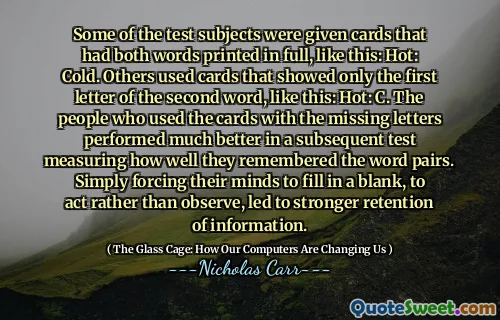"The Glass Cage: How Our Computers Are Changing Us" by Nicholas Carr explores the profound impact of technology, particularly computers and automation, on human behavior and society. Carr argues that as we increasingly rely on machines to perform tasks, we may be losing essential cognitive skills and the ability to think independently. He examines various examples, from driving to decision-making, illustrating how automation can create a barrier between us and direct experience.
Throughout the book, Carr discusses the paradox of technological advancement; while automation can enhance efficiency, it can also lead to diminished human capabilities. The author emphasizes that relying too heavily on computers can hinder our creativity and critical thinking, ultimately making us more passive learners and thinkers. He presents a case for a balanced approach to technology, where we embrace its benefits without allowing it to fully take over our cognitive processes.
In conclusion, Carr warns that the increasing presence of technology in our daily lives can lead to an erosion of personal agency and intellectual engagement. He encourages readers to reflect on their relationship with technology and consider how to use it in a way that fosters, rather than diminishes, human potential. "The Glass Cage" serves as a thought-provoking examination of digital life and its effects on our minds, urging a dialogue on the balance between human ingenuity and reliance on machines.
More »
Today Birthdays
1948 -
Ruth Reichl
1933 -
Susan Sontag
1980 -
Lin-Manuel Miranda
1970 -
Garth Ennis
1947 -
Laura Schlessinger
1968 -
Rebecca Stead
1974 -
Kate Moss
1749 -
Vittorio Alfieri
1950 -
Debbie Allen
1968 -
Stephan Pastis
1907 -
Paul Nitze
1828 -
Karl G. Maeser
1944 -
Jill Tarter
1912 -
Nigel Dennis
1910 -
Dizzy Dean
1959 -
Sade Adu
1943 -
Brian Ferneyhough
1979 -
Aaliyah
1982 -
Birgitte Hjort Sorensen
1987 -
Jake Epstein
1988 -
FKA twigs
1946 -
Kabir Bedi
1958 -
Anatoli Boukreev
1901 -
Laura Riding
1917 -
Carl Karcher
1935 -
A. J. Foyt
1942 -
Barbara Lynn
1969 -
Alexander Acosta
